MercoPress. South Atlantic News Agency
Tag: Shanghai Composite Index
-
Friday, August 14th 2015 - 09:58 UTC
China and Asian markets begin to react to new Yuan daily rate-fix policy

Chinese shares rose on Friday as the central bank set the reference rate for the Yuan slightly stronger. The bank set the rate at 6.3975 per dollar compared to Thursday's close of 6.3982.
-
Wednesday, August 12th 2015 - 07:51 UTC
Wednesday’s China shockwave: Yuan devalued 1.6%; IMF support, US Treasury cautious

Chinese shares were lower on Wednesday as its central bank again devalued the yuan, following Tuesday's record cut. The People's Bank of China fixed the daily guiding rate for the currency down 1.6% to 6.3306 against the dollar.
-
Tuesday, July 28th 2015 - 07:00 UTC
Chinese shares on the slide after dropping 8% on Monday; central bank to inject liquidity

Shares in mainland China continued their slide on Tuesday, after a historic sell-off the previous day. The Shanghai Composite fell by 4.3% to 3,567.38 points in early trade, after the index on Monday saw its biggest drop in eight years with an 8% tumble.
-
Wednesday, July 15th 2015 - 06:33 UTC
Relief from China as economy expands 7% in second quarter from a year ago

Growth in the world's second largest economy, China, beat expectations in the second quarter, but it was still the weakest showing since the global financial crisis. The economy grew 7% from a year ago - matching growth in the first three months of the year, which was the lowest since 2009 when it fell to 6.6%.
-
Thursday, July 9th 2015 - 05:58 UTC
China markets' volatility slide spreading to the rest of Asia
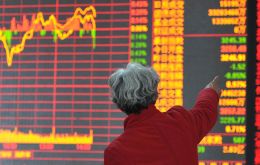
Mainland Chinese shares continued to head lower on Thursday, leading the rest of Asia down as concerns over the market's steep slide spread. The benchmark Shanghai Composite was down 3.6% to 3,380.31 points despite aggressive measures by regulators such as banning big investors from selling stocks to boost the flagging market.
-
Wednesday, July 8th 2015 - 09:08 UTC
Chinese markets' volatility edging 'panic sentiment', admit regulators
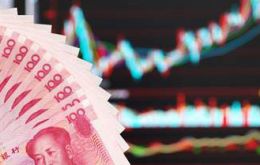
Mainland Chinese shares continued to slide on Wednesday, falling more than 8% on opening. The slump came despite more moves by China's regulators to try and stabilize the recently volatile market.
-
Tuesday, July 7th 2015 - 10:00 UTC
Chinese markets volatility continue despite government measures

Chinese stocks plunged Tuesday after mixed fortunes Monday, with the benchmark Shanghai Composite Index tumbling 3.2% at opening. The Shenzhen Component Index also opened 3.4% lower and the ChiNext Index, tracking growth enterprises, opened 3.8% lower.
-
Monday, July 6th 2015 - 08:46 UTC
Shanghai Composite picking up strongly as fund managers buy stocks
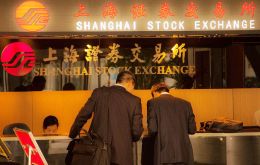
Mainland Chinese shares surged nearly 8% on Monday despite the rest of Asian markets trading lower on Greece's rejection of austerity demands. The Shanghai Composite was up 2.6% to 3,783.69 after the government announced measures over the weekend to stabilize the tumbling stock markets.
-
Tuesday, June 25th 2013 - 19:49 UTC
Chinese stocks tumble as Beijing announces an end to the era of cheap credit
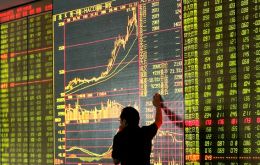
Chinese stocks touched a four-and-a-half-year low on Tuesday amid persistent concerns over the government's credit-tightening policy. The Shanghai Composite SSE index fell as much as 5.8% at one point, before a late rally meant it ended down 0.3%.
-
Wednesday, May 12th 2010 - 07:16 UTC
China April Inflation Accelerates and Property Prices Jump 12.8%
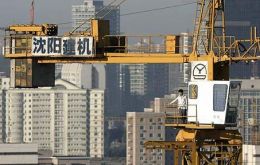
April inflation in China has accelerated as bank lending exceeded estimates and property prices jumped by a record, increasing pressure on the government to raise interest rates and let the currency appreciate.
